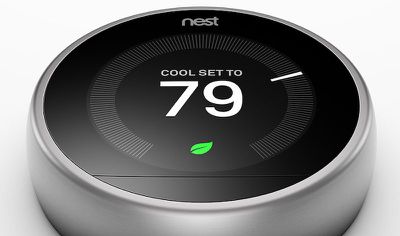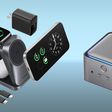Nest is in the process of making a cheaper edition of its Nest Learning Thermostat as well as a new line of home security products, according to someone familiar with the company's plans speaking with Bloomberg. Nest is said to be "seeking a bigger share of the connected home market" in its move to make a cheaper version of its flagship thermostat device.
The cheaper Nest Learning Thermostat would sell for under $200, while the current edition of the device is priced at $249 on the Nest Store. The cheaper model is believed to keep the same temperature learning functionality of the thermostat, but be manufactured with less expensive components and potentially do away with the current version's metal edges.

Nest is also said to be developing sensors that will act as expansions to existing thermostat systems, and allow users to control the temperature of specific rooms instead of just the entire home. The cheaper thermostat is predicted to launch by next year.
The company is working on a version of its "learning thermostat," which adjusts the temperature based on usage patterns, that would sell for under $200, the person said. The current version sells for $249. The cheaper model would include less expensive components and at least one internal prototype lacks the flagship model's metal edges, the person said.
A home-security alarm system, a digital doorbell and an updated indoor security camera are also in the works, representing potential good news for a company that has struggled to release many new products.
An all-new home security alarm system, digital doorbell, and updated indoor camera "are also in the works." The home security system will have a central hub with a keypad that connects to a collection of alarm sensors that users place on windows and doors.
After being set up, it will act like a normal security system and ring when the home is entered until the right code is entered on the keypad hub. A keyring fob accessory can also be used to initiate and disable the alarm in lieu of typing in a code. Like all of Nest's products, a connected iOS app will allow home owners to disengage the alarm to let specific people into a home when they are away.
An update to the Nest Indoor Cam could see a way for the camera to identify specific people within its range, according to the person familiar with Nest's plans, who also detailed the company's intention to launch a digital doorbell system with a video camera and face-to-face communication via the mobile app. The home security system is believed to arrive this year, the updated Nest Indoor Cam could launch as soon as this fall, and the digital doorbell is estimated to see a debut sometime in 2018.





















Top Rated Comments
- incorporating it into your home automation recipes which involve devices from multiple vendors (lighting, locks, doors, etc). these can be geo fenced, timed, or kicked off via siri. Using one automation system is better than two or more, which is the world we'd live in if nobody supported HK like Nest.
- HomeKit is the most secured of IoT devices, due to authentication and encryption chips.
Assuming Nest completely copies Ecobee's remote sensor idea, you could use their occupancy sensors to trigger HomeKit rules. Turn lights on/off, change the temperature to a certain level while someone is in a certain room (home gym), etc.
HomeKit isn't an app, it's a foundation used by many apps. Ecobee's native app uses HomeKit, for example. You can use it to create scenes like "Good Morning", which could set your temp to something predefined, turn on certain lights, maybe start coffee brewing.
Other HomeKit apps (like Apple's Home, or Elgato's Eve) will be able to see/modify that scene. This lets companies (like Ecobee) have control over how they want their app to look and feel, but still let their hardware play with others.
I'm super disappointed about lack of HomeKit support because it still is the best looking thermostat. The rest look cheap and plasticy in comparison.